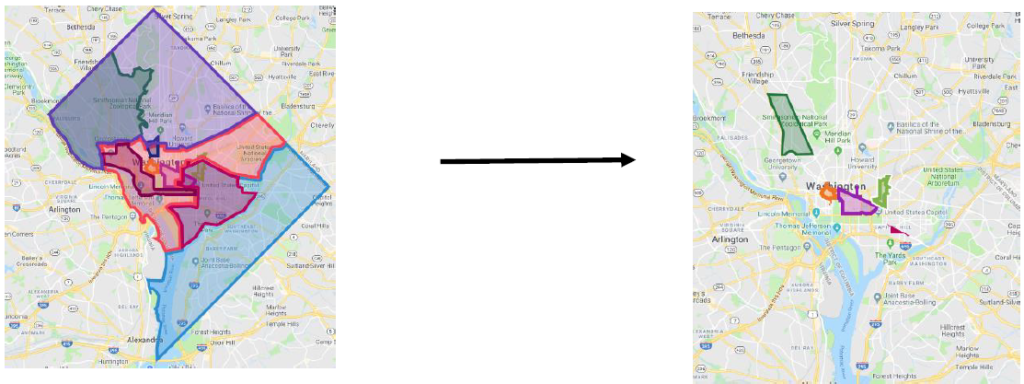Chairperson Cheh and other members of the Committee, thank you for the opportunity to testify today. My name is Kate Coventry, and I am the Senior Policy Analyst of the DC Fiscal Policy Institute. DCFPI is a non-profit organization that promotes budget choices to address DC’s economic and racial inequities and to build widespread prosperity in the District of Columbia, through independent research and policy recommendations.
I’m here today to support Act 21-0549, the Improving Access to Identity Documents Act of 2016 and to urge the Council to fund the Act in the fiscal year (FY) 2020 budget. I am also here to urge the Council to find additional funding for housing and services for residents experiencing chronic homelessness.
Improving Access to Identity Documents Act
Passed unanimously by the Council, the Improving Access to Identity Documents Act allow low-income residents to get critical identifying documents for free – including DC birth certificates, driver’s licenses, and ID cards. As the provider of drivers’ licenses and non-driver IDs, the Department of Motor Vehicles will play a key role in the implementation of this Act.
This Act is an important step towards reducing the barriers low-income residents often face in getting critical ID documents. It recognizes that paying for an ID can be a problem for low-income residents, and this is confirmed by DCFPI’s research on income and affordable housing trends in the District. For example, the poorest fifth of DC households have average income of under $10,000, according to a DCFPI report. Incomes for these residents have fallen over the past decade, in the midst of sharply rising housing costs.
This means that many DC households struggle to meet even their most basic needs each month. An expense that may seem modest to many of us – such as the $47 cost of a driver license – can be prohibitive to someone who routinely has too little to pay their rent or stock their refrigerator. This Act ensures that all households have access to the vital documents needed when applying for a job or social services.
DCFPI asks the Council to fully fund this Act in the FY 2020 budget.
Additional Investments Needed for Residents Experiencing Chronic Homelessness
Residents experiencing chronic homelessness have been homeless for a long time and suffer from physical and/or mental health issues.
The Mayor’s FY 2020 budget includes $8.8 million to end chronic homelessness for 325 individuals through Permanent Supportive Housing (PSH), a proven and life-saving housing intervention that combines affordable housing with intensive wraparound services. This is 24 fewer units than included in the FY 2019 budget and falls far short of the investments needed to end homelessness for those most at risk of dying on the streets or in shelter. While a step in the right direction, the proposed funding meets just 33 percent of The Way Home campaign’s recommendations and only 20 percent of the overall need, leaving 1,319 individuals in urgent need of PSH.
The budget includes just $420,070 to end chronic homelessness for 20 individuals through Targeted Affordable Housing (TAH) which provides long -term affordable housing for individuals who need help paying rent but don’t need the intensive services provide with PSH. This meets just 6.5 percent of the need and only 13 percent of The Way Home campaign’s recommendation. It is also 90 fewer units than were included in the FY 2019 budget.
We urge the DC Council to preserve the current investments in TAH and PSH and invest an additional $18.2 million in PSH to serve 661 individuals and $2.6 million in TAH to serve 134 individuals.
Additionally, there is a critical gap in funding for outreach services which help hard-to-reach individuals experiencing chronic homelessness who are sleeping on the street and suffering from severe health problems that are hard to manage while living outside. Homeless Street Outreach works in a coordinated way to help support some of our most vulnerable neighbors experiencing homelessness by connecting them to housing and other supportive services while also increasing health, safety, and quality of life while people are unsheltered. Over the past three years, DC has used federal funding to pay for street outreach that has ended homelessness for over 325 individuals. A review of studies found that outreach services improve health and housing outcomes.[1]
This vital federal funding expires at the end of April. Without sustainable funding for FY 2020 and beyond, current street outreach capacity will decrease by 25 staff people, leaving just 15 dedicated staff. This will significantly diminish the supports available to over 600 individuals who are unsheltered. It will also greatly reduce the number of neighborhoods with outreach services (see maps below). We are deeply concerned about how this cut will affect some of our most vulnerable neighbors. We urge the Council to add $3.5 million in local funds to fill this critical gap in services.
Thank you for the chance to testify and I’m happy to answer any questions.
[1] Jeffrey Olivet, Ellen Bassuk, Emily Elstad, Rachael Kenney and Lauren Jassil. Outreach and Engagement in Homeless Services: A Review of the Literature https://dmh.mo.gov/docs/mentalillness/litreview.pdf

